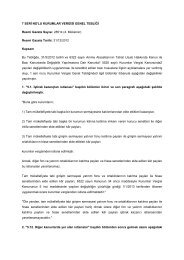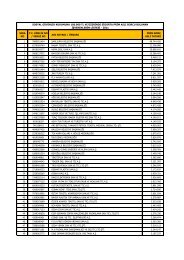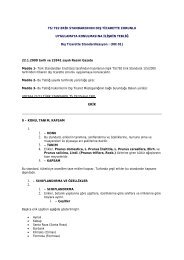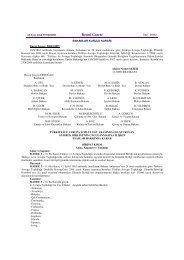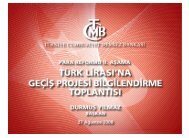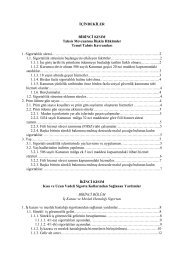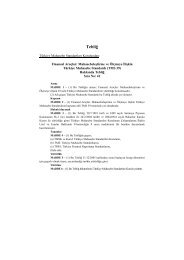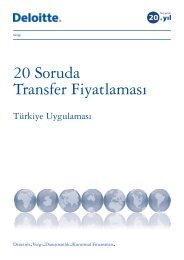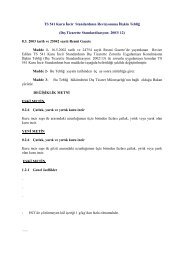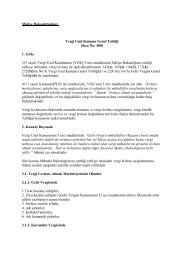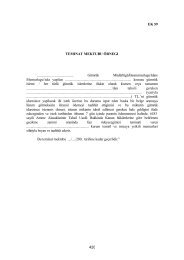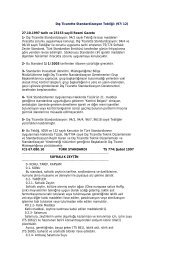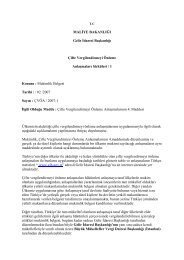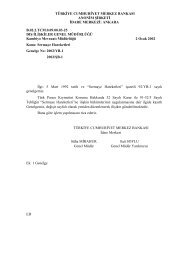Transfer Pricing Guidelines Issued By IRAS - Deloitte
Transfer Pricing Guidelines Issued By IRAS - Deloitte
Transfer Pricing Guidelines Issued By IRAS - Deloitte
You also want an ePaper? Increase the reach of your titles
YUMPU automatically turns print PDFs into web optimized ePapers that Google loves.
Singapore<br />
Home Forward Privacy<br />
Corporate Tax News 16 March 2006<br />
<strong>Transfer</strong> <strong>Pricing</strong> <strong>Guidelines</strong> <strong>Issued</strong> <strong>By</strong> <strong>IRAS</strong><br />
The Inland Revenue Authority of Singapore (<strong>IRAS</strong>) published <strong>Transfer</strong> <strong>Pricing</strong> <strong>Guidelines</strong><br />
(the <strong>Guidelines</strong>) on 23 February 2006. The <strong>Guidelines</strong> represent the first time <strong>IRAS</strong> has<br />
published its interpretation of the provisions of the Singapore Income Tax Act affecting the<br />
pricing of cross-border related party dealings.<br />
The <strong>Guidelines</strong> have a continuing emphasis on assisting Singapore companies to avoid<br />
double taxation. <strong>IRAS</strong> has adopted the arm’s length principle and accepted the definition of<br />
the arm’s length principle endorsed by the Organisation for Economic Co-operation and<br />
Development (OECD) (although Singapore is not a member of the OECD). This aligns<br />
Singapore’s transfer pricing rules with the standard adopted in the transfer pricing rules of<br />
most jurisdictions and should assist Singapore companies in minimising double taxation. In<br />
addition, <strong>IRAS</strong> has prescribed in detail the procedures and documentation requirements for<br />
requests to invoke mutual agreement procedures and requests for advance pricing<br />
arrangements and outlined the guiding principles applying to both processes.<br />
The <strong>Guidelines</strong> include detailed chapters on the application of the arm’s length principle,<br />
documentation requirements, advance pricing arrangements and requests to invoke mutual<br />
agreement procedures under Singapore’s double taxation agreements.<br />
Arm’s Length Principle<br />
<strong>Transfer</strong> pricing refers to the consideration provided for transfers of goods, services and<br />
property between related parties. The arm’s length principle holds that transactions<br />
between related parties should be conducted on similar terms to those that would have<br />
been agreed had those parties been dealing independently from one another in otherwise<br />
similar circumstances.<br />
<strong>IRAS</strong> has endorsed the arm’s length principle and the <strong>Guidelines</strong> state that the arm’s length<br />
principle will be used to assess the various provisions of Singapore’s tax law (including the<br />
Singapore Income Tax Act and its double tax agreements) that apply to cross-border related<br />
party dealings. <strong>IRAS</strong> has noted that by adopting the same principle applied in most tax<br />
jurisdictions, the potential for double taxation of Singapore companies should be reduced.<br />
1
<strong>IRAS</strong> has recommended a three-step approach to applying the arm’s length principle, which<br />
involves:<br />
• Step 1 – Conduct a comparability analysis;<br />
• Step 2 – Identify the appropriate transfer pricing method and tested party; and<br />
• Step 3 – Determine the arm’s length results.<br />
<strong>Pricing</strong> Methods<br />
The <strong>Guidelines</strong> outline and discuss five commonly used transfer pricing methods and advise<br />
that a taxpayer can select any of the five methods, or a modified version of any of those<br />
methods. The five methods are:<br />
• The traditional transaction methods:<br />
o The comparable uncontrolled price method;<br />
o The resale price method; and<br />
o The cost plus method.<br />
• The transactional profit methods:<br />
o The profit split method; and<br />
o The transaction net margin method.<br />
The <strong>Guidelines</strong> state that the method that should be applied is the method that produces<br />
the most reliable results, taking into account the quality of available comparable data and<br />
the degree of accuracy of any adjustments required.<br />
Documentation<br />
The <strong>Guidelines</strong> advise taxpayers to exert reasonable efforts to undertake a sound transfer<br />
pricing analysis to ascertain that transfer prices comply with the arm’s length principle. The<br />
<strong>Guidelines</strong> state that the objective of preparing transfer pricing documentation is to enable<br />
the taxpayer “to readily demonstrate that it has exerted reasonable efforts to ensure that its<br />
transfer prices are consistent with the arm’s length principle.”<br />
The <strong>Guidelines</strong> state that taxpayers are only required to prepare or obtain documents<br />
necessary to allow a reasonable assessment of whether they have complied with the arm’s<br />
length principle. In this regard, companies should evaluate the substantiality and<br />
complexity of the related party transactions they are involved in as well as the costs of<br />
compliance arising from documentation. Companies are not expected to go to such lengths<br />
that the compliance costs arising from the preparation of documentation are<br />
disproportionate to the amount of tax revenue at risk, or to the complexity of the<br />
transactions. A guide to the type of information that would be helpful in substantiating<br />
compliance with the arm’s length principle is provided in the <strong>Guidelines</strong>.<br />
<strong>Transfer</strong> pricing documentation will not be required to be submitted when annual tax<br />
returns are filed. Documentation should be kept by companies and submitted to <strong>IRAS</strong> on<br />
request. The <strong>Guidelines</strong> recommend maintaining transfer pricing documentation in line with<br />
the record-keeping requirements of the Singapore Income Tax Act, which currently require<br />
companies to maintain records for seven years from the relevant year of assessment.<br />
2
Mutual Agreement Procedures (“MAP”)<br />
Singapore has an extensive network of over 50 comprehensive double taxation agreements<br />
(DTAs) between Singapore and other tax jurisdictions. All of Singapore’s DTAs provide for a<br />
MAP to resolve instances of double taxation. A MAP involves the nominated representatives<br />
(referred to in the DTAs as “competent authorities”) of both jurisdictions under a relevant<br />
DTA, meeting to reduce or eliminate the extent of double taxation encountered by a<br />
taxpayer in one or both jurisdictions. <strong>IRAS</strong> acts as the competent authority of Singapore for<br />
the purposes of MAP discussions.<br />
Where a taxpayer is subject to a transfer pricing adjustment in a foreign jurisdiction which<br />
has a DTA with Singapore in respect of transactions with a related Singapore taxpayer, the<br />
taxpayer can request <strong>IRAS</strong> to invoke the MAP process to reduce or eliminate the double<br />
taxation arising from the transfer pricing adjustment.<br />
The <strong>Guidelines</strong> state that <strong>IRAS</strong> will generally accept a taxpayer’s request for MAP if:<br />
a) The taxpayer has complied with the time limit specified in the applicable DTA for<br />
presenting the MAP request; and<br />
b) Double taxation is almost certain (i.e., double taxation should not be just a possibility,<br />
such as the mere occurrence of audit or examinations); and<br />
c) The taxpayer is willing and able to render full co-operation throughout the process. In<br />
this aspect, <strong>IRAS</strong> will, amongst other things, evaluate taxpayer’s quality of<br />
documentation.<br />
The <strong>Guidelines</strong> also explain the steps involved in the MAP process, the information required<br />
in formal MAP requests and give undertakings on the timing and content of responses<br />
provided to companies by <strong>IRAS</strong>.<br />
Advance <strong>Pricing</strong> Arrangements (APAs)<br />
APAs are agreements between taxpayers and tax authorities in one or more jurisdictions<br />
regarding the transfer pricing practices to be adopted for a prospective period. APAs specify<br />
the transfer pricing arrangements that will be considered to be consistent with tax rules in<br />
the jurisdiction of the tax authorities that are party to the APA. APAs can be either<br />
unilateral (involving a single tax authority) or bilateral (involving two tax authorities).<br />
The <strong>Guidelines</strong> state that <strong>IRAS</strong> will make APAs available on both a unilateral and bilateral<br />
basis to Singapore companies. Requests for APAs will generally be accepted “if there is a<br />
genuine motive to obtain certainty for the avoidance of double taxation and the request<br />
relates to specific current or future transactions that are not hypothetical.”<br />
The duration of an APA should be for the periods where the critical assumptions and<br />
commercial factors that have a significant impact on the validity of the APA are expected to<br />
remain unchanged. The <strong>Guidelines</strong> state a period of 3-5 years based on <strong>IRAS</strong> experience to<br />
date. The <strong>Guidelines</strong> also state that APAs may be applied to prior years (known as “rollback”<br />
of the APA) where the criteria mentioned above apply.<br />
The <strong>Guidelines</strong> explain the steps involved in the APA process, the information required in<br />
formal APA requests and submissions and give undertakings on the timing and content of<br />
responses provided to companies by <strong>IRAS</strong>.<br />
3
<strong>Deloitte</strong> View – Action Required<br />
Our view is that the release of the <strong>Guidelines</strong> represents a major shift in the stance taken<br />
by <strong>IRAS</strong> on transfer pricing issues. <strong>IRAS</strong> has provided certainty of its interpretation of the<br />
transfer pricing provisions of Singapore’s tax law and has given a clear indication of its<br />
willingness to assist Singapore companies to avoid double taxation.<br />
We recommend that companies assess whether their existing transfer pricing arrangements<br />
warrant the preparation of transfer pricing documentation. This will involve evaluating the<br />
substantiality and complexity of related party dealings and the benchmarking support<br />
available to demonstrate compliance with the arm’s length principle. If transfer pricing<br />
documentation is considered necessary, the three-step process outlined by <strong>IRAS</strong> should be<br />
followed to demonstrate the application of an accepted transfer pricing method.<br />
In addition, Singapore companies should consider whether an APA might be appropriate for<br />
all or part of their related party dealings. The availability of bilateral APAs represents a<br />
significant opportunity for Singapore companies and this option should be considered in<br />
situations with substantial exposure to transfer pricing adjustments. With the growing<br />
attention paid to transfer pricing by authorities around the region, we expect the application<br />
of APAs to grow quickly.<br />
<strong>Deloitte</strong>’s transfer pricing specialists are highly experienced in advising on transfer pricing<br />
matters including transfer pricing documentation, APAs and tax audits/investigations of<br />
transfer pricing matters. Our Singapore <strong>Transfer</strong> <strong>Pricing</strong> team can be contacted directly if<br />
you have any queries about the <strong>Guidelines</strong> or would like to discuss the development of an<br />
effective response.<br />
If you need any clarifications, your contacts at <strong>Deloitte</strong> Singapore are:<br />
<strong>Transfer</strong> <strong>Pricing</strong><br />
Linda Foo<br />
Tel: +65 6530 5562<br />
Email: lfoo@deloitte.com<br />
David Bell<br />
Tel: +65 6216 3185<br />
Email: davbell@deloitte.com<br />
Cassandra Soon<br />
Tel: +65 6216 3129<br />
Email: casoon@deloitte.com<br />
Corporate Tax Services<br />
Ajit Prabhu<br />
Tel: +65 6530 5522<br />
Email: aprabhu@deloitte.com<br />
Linda Foo<br />
Tel: +65 6530 5562<br />
Email: lfoo@deloitte.com<br />
Sum Yee Loong<br />
Tel: +65 6530 5538<br />
Email: ysum@deloitte.com<br />
Chan Huang Chay<br />
Tel: +65 6530 5536<br />
Email: hchan@deloitte.com<br />
Low Hwee Chua<br />
Tel: +65 6216 3290<br />
Email: hwlow@deloitte.com<br />
Steve Towers<br />
Tel: +65 216 3277<br />
Email: stowers@deloitte.com<br />
4
International Assignment Services<br />
Jill Lim<br />
Tel: +65 6530 5519<br />
Email: jilim@deloitte.com<br />
Indirect Tax Services<br />
Nigel Mellor<br />
Tel: +65 6530 5523<br />
Email: nimellor@deloitte.com<br />
Mike Vaughan<br />
Tel: +65 6216 3256<br />
Email: mcvaughan@deloitte.com<br />
About <strong>Deloitte</strong> Singapore<br />
<strong>Deloitte</strong> refers to one or more of <strong>Deloitte</strong> Touche Tohmatsu, a Swiss Verein, its member<br />
firms, and their respective subsidiaries and affiliates. <strong>Deloitte</strong> Touche Tohmatsu is an<br />
organization of member firms around the world devoted to excellence in providing<br />
professional services and advice, focused on client service through a global strategy<br />
executed locally in nearly 150 countries. With access to the deep intellectual capital of<br />
120,000 people worldwide, <strong>Deloitte</strong> delivers services in four professional areas—audit, tax,<br />
consulting, and financial advisory services—and serves more than one-half of the world’s<br />
largest companies, as well as large national enterprises, public institutions, locally important<br />
clients, and successful, fast-growing global growth companies. Services are not provided by<br />
the <strong>Deloitte</strong> Touche Tohmatsu Verein, and, for regulatory and other reasons, certain<br />
member firms do not provide services in all four professional areas.<br />
As a Swiss Verein (association), neither <strong>Deloitte</strong> Touche Tohmatsu nor any of its member<br />
firms has any liability for each other’s acts or omissions. Each of the member firms is a<br />
separate and independent legal entity operating under the names “<strong>Deloitte</strong>,” “<strong>Deloitte</strong> &<br />
Touche,” “<strong>Deloitte</strong> Touche Tohmatsu,” or other related names.<br />
Disclaimer<br />
These materials and the information contained herein are provided by <strong>Deloitte</strong> Touche Tohmatsu and are intended to provide<br />
general information on a particular subject or subjects and are not an exhaustive treatment of such subject(s).<br />
Accordingly, the information in these materials is not intended to constitute accounting, tax, legal, investment, consulting, or<br />
other professional advice or services. The information is not intended to be relied upon as the sole basis for any decision which<br />
may affect you or your business. Before making any decision or taking any action that might affect your personal finances or<br />
business, you should consult a qualified professional adviser.<br />
These materials and the information contained therein are provided as is, and <strong>Deloitte</strong> Touche Tohmatsu makes no express or<br />
implied representations or warranties regarding these materials or the information contained therein. Without limiting the<br />
foregoing, <strong>Deloitte</strong> Touche Tohmatsu does not warrant that the materials or information contained therein will be error-free or<br />
will meet any particular criteria of performance or quality. <strong>Deloitte</strong> Touche Tohmatsu expressly disclaims all implied warranties,<br />
including, without limitation, warranties of merchantability, title, fitness for a particular purpose, noninfringement,<br />
compatibility, security, and accuracy.<br />
Your use of these materials and information contained therein is at your own risk, and you assume full responsibility and risk of<br />
loss resulting from the use thereof. <strong>Deloitte</strong> Touche Tohmatsu will not be liable for any special, indirect, incidental,<br />
consequential, or punitive damages or any other damages whatsoever, whether in an action of contract, statute, tort<br />
(including, without limitation, negligence), or otherwise, relating to the use of these materials or the information contained<br />
therein.<br />
If any of the foregoing is not fully enforceable for any reason, the remainder shall nonetheless continue to apply.<br />
© 2006 <strong>Deloitte</strong> Touche Tohmatsu. All rights reserved<br />
5



